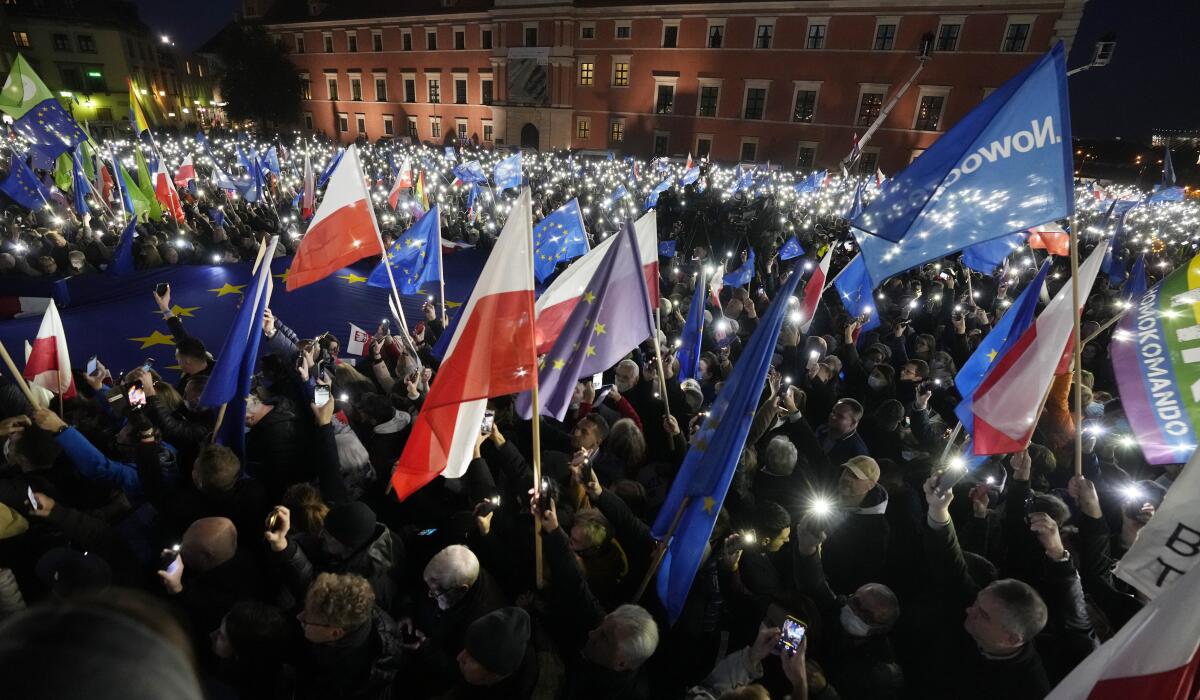Poland leader: Talk of ‘Polexit’ is ‘fake news’

WARSAW — Poland’s prime minister on Monday denied that his government wants to take the country out of the European Union, or do a “Polexit,” saying it was a “harmful myth.”
Mateusz Morawiecki was reacting to massive nationwide protests Sunday against government policy that critics say could cost Poland its EU membership. The protests were sparked by a top court’s ruling that the Polish Constitution has supremacy over EU law. The case was initiated by Morawiecki, who voiced doubts as to the supremacy of the EU’s laws.
Morawiecki tweeted Monday that “Polexit” is “fake news.” He stressed that all of Poland’s obligations resulting from EU law “remain in force.”
The EU, he tweeted, “is too serious a Community to be taken into the realm of fairy tales. It is a place of mutual benefits, but also of real challenges to all the Union nations.”
Policies by Poland’s right-wing government, mainly in the justice sector, have been the basis of repeated clashes with the EU.
Archbishop Stanislaw Gadecki, the head of Poland’s influential Roman Catholic Episcopate and a supporter of the government, told Vatican Radio “we all want to stay in Europe,” and “no reasonable person wants to leave it.”
Authorities estimate that up to 100,000 people attended protests Sunday in Warsaw; additional protests were held in other Polish cities.
Warsaw police said four people were detained, including Morawiecki’s nephew Franek Broda, who alleged that a police officer kicked him in the head while he was on the ground.
Warsaw police spokesman Sylwester Marczak confirmed the temporary detention of Broda, with the use of handcuffs, but did not address allegations of police brutality. Broda, 18, is a government critic and an activist for LGBTQ rights.
A few dozen people were fined for lighting flares and obstructing traffic during the protest and subsequent march to the headquarters of Poland’s ruling right-wing nationalist Law and Justice Party.
Critics and opposition parties say the ruling by the constitutional court, where many judges are government loyalists, can be seen as a rejection of EU values and may potentially lead to Poland being forced out of the 27-member bloc.
Poland’s government is seeking control over the country’s courts and judges, a move that has put it in conflict with the EU for six years. The EU views the pursued changes as an erosion of democratic checks and balances.
EU membership is widely appreciated in Poland; it has brought freedoms such as the ability to travel and has economically transformed the nation, which endured decades of communist rule until 1989.
Morawiecki asked the constitutional court for a review after the European Court of Justice ruled in March that Poland’s new regulations for appointing Supreme Court justices undermine judicial independence and could violate EU law. The European court ordered the right-wing government to suspend the regulations; the government has not done so.
More to Read
Sign up for Essential California
The most important California stories and recommendations in your inbox every morning.
You may occasionally receive promotional content from the Los Angeles Times.










